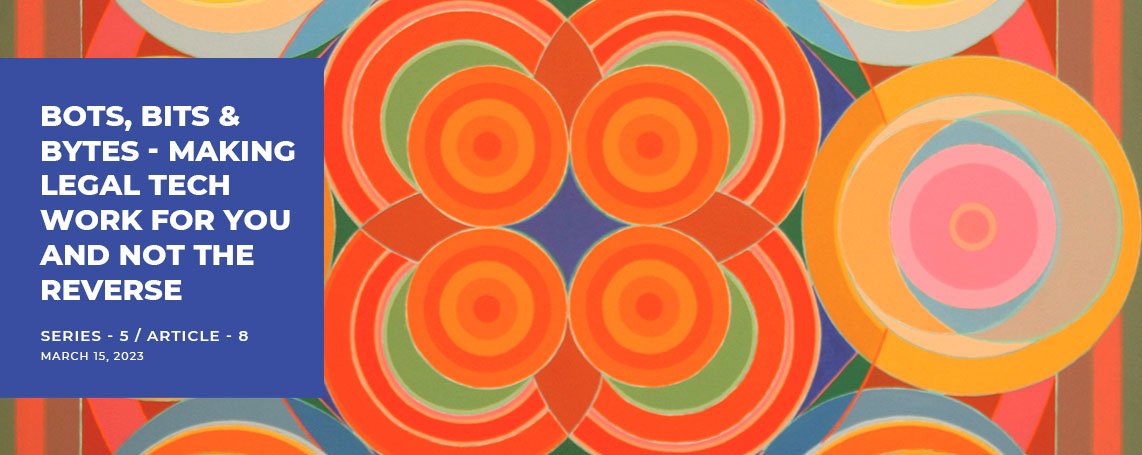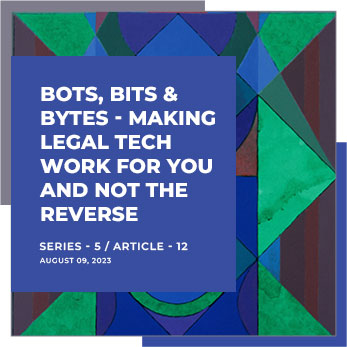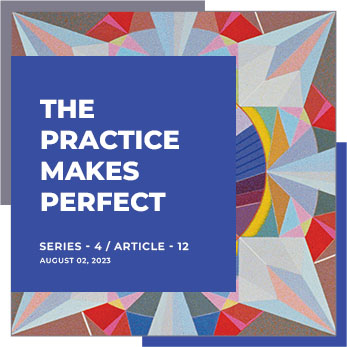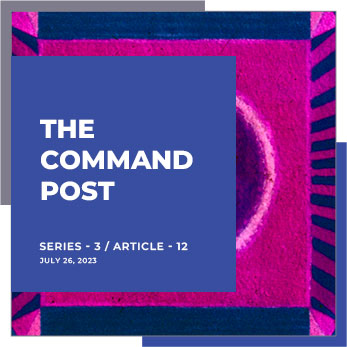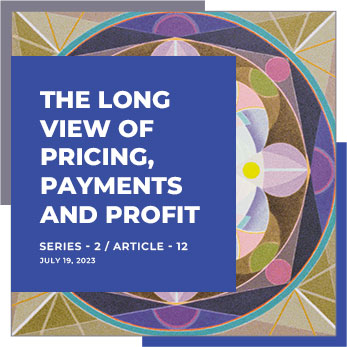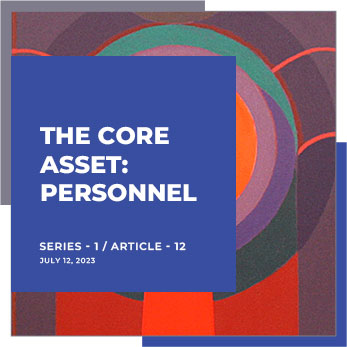“Like the use of any IT service which requires input or other exposure of data to a program hosted beyond an organization’s firewall, the use of ChatGPT poses a risk to the confidentiality and privilege of any data which it is asked to consider.”
Artificial Intelligence (AI) is a technology tool already well-established in the legal world. From research platforms such as Lexis/Nexis and Westlaw to numerous other legal databases, AI is playing an increasingly important role in assisting lawyers in their work. Even beyond its research function, AI can be utilized to evaluate the likelihood of a particular case being profitable or not and can assist the judiciary with such matters as determining pre-trial detention, flight risk, and other determinations in the course of legal proceedings.
So why should the next level of AI, namely ChatGPT, be a cause of concern among legal practitioners? It is not just the lack of practical familiarity with the technology that has some observers worried, but rather the ethical implications of what happens when an unlicensed and largely unregulated bot starts representing clients.
Embracing ChatGPT
In November 2022, tech company OpenAI unveiled ChatGPT, a type of natural language generation model. While the ‘Chat’ part of the moniker might be self-explanatory, the GPT stands for Generative Pre-Trained Transformer—an assembly of language models trained to use deep machine learning to generate human-like texts based on certain inputs.
Although ChatGPT is finding a new home in such varied disciplines as journalism, customer service, art, marketing, and creative content generation, its acceptance in the practice of law has been met with both enthusiasm and skepticism. Advocates of ChatGPT argue that it has the ‘potential to change the world’, but more to the point, it will change the manner in which legal work is performed across virtually all practice areas. So, what is the downside?
A Product of its Human Trainers
Human beings, of course, largely function in accordance with how they were raised and educated. With AI, it is the same, except that in place of parents and school teachers, AI’s responses are the result of input by trainers. In fact, even while in its ‘training stage’, Chat GPT is still getting used to what human trainers are ticking or unticking as the ‘correct’ response or generation. According to OpenAI’s website: “ChatGPT was optimized for dialogue by using Reinforcement Learning with Human Feedback (RLHF) – a method that uses human demonstrations and preference comparisons to guide the model toward desired behavior.” This means that trainer bias or ‘preference comparisons’ can—and do—influence the end product generated by ChatGPT, whether it be a poem, a news report, or a legal strategy.
It is this trial-and-error training that has resulted in various inaccurate or ‘misinformed’ responses—at least at the present stage of training and development. Furthermore, the output, it seems, can only be as reliable as the data inputted into the algorithms of the model.
The Bot’s Own Legal Disclaimers
The reliability and veracity of ChatGPT responses are further disclaimed by OpenAI by stating: ‘ChatGPT is not connected to the internet, and it can occasionally produce incorrect answers. It has limited knowledge of world and events after 2021 and may also occasionally produce harmful instructions or biased content.’
But most germane to the ethical issues applicable to attorney use of ChatGPT is the caveat that others can view the conversations conducted with ChatGPT: “As part of our commitment to safe and responsible AI, we review conversations to improve our systems and to ensure the content complies with our policies and safety requirements”, and, “Your conversations may be reviewed by our AI trainers to improve our systems.” Therein lies the most salient professional ethics risk for lawyers eager to use ChatGPT due to disclosures made in the course of ChatGPT conversations clashing directly with the ABA’s Model Rules of Professional Conduct (MRPC).
MRPC 1.6
Most states require that attorneys practicing in their jurisdictions abide by some version of the ABA’s MRPC 1.6: Confidentiality of Information., which provides: “A lawyer shall not reveal information relating to the representation of a client unless the client gives informed consent, the disclosure is impliedly authorized in order to carry out the representation, or the disclosure is permitted by paragraph (b).” Although the referenced paragraph (b) lists seven exceptions to breaking confidentiality, none of them allow for disclosing confidential client information to a machine learning model accessible by others.
The risk of disclosing confidential client information to a model that can be viewed by others is further underscored by MPRC 1.6 (c), which states: “A lawyer shall make reasonable efforts to prevent the inadvertent or unauthorized disclosure of, or unauthorized access to, information relating to the representation of a client.” Clearly, inputting client information to ChatGPT—whether for training purposes, product development, or intended practical use—would be a violation of such disclosure prohibition.
Practicality of a Waiver
Although, as stated above, the ABA MRPC provides for the possibility of a client giving informed consent and thereby waiving the duty of confidentiality owed by the attorney, such waivers normally pertain to situations where an attorney might have to share such confidential information with a known, specific, and limited party such as an expert witness, private investigator, or tax accountant. The disclosure authorized by the client as to further dissemination can therefore be defined and limitations imposed. In the case of disclosures to ChatGPT, however, parties far removed from the attorney-client relationship and any necessary outside parties will need to access the information—with an all but impossibility of halting further dissemination of the information. This, of course, raises the question as to how just ‘informed’ the waiver of a client could be in such a situation.
A further complication to the purported client waiver as to information shared with ChatGPT is that once information is entered, it cannot be deleted. Even FAX transmittals and emails from lawyers typically contain the proviso that if misdirected to the wrong party, the material must be promptly returned and kept confidential. No such option exists once the genie of confidential client content is out of the proverbial bottle.
Bottom Line for Lawyers
Although ChatGPT has been touted as holding tremendous promise for the future of the practice of law, in its present iteration, the language model does not in the least provide safeguards for maintaining client confidentiality, and therefore any lawyers uploading any client information to the platform run a very real risk of breaching their professional conduct responsibilities and exposing themselves to professional liability.
Executive Summary
The Issue
What are the legal ethics implications for lawyers who want to use ChatGPT technology?
The Gravamen
Lawyers sharing client information—whether deemed confidential or not—with ChatGPT are, as a matter of course, sharing that information with numerous, unknown outside parties.
The Path Forward
Even when acting pursuant to a client waiver of confidentiality, the lawyer who shares information with ChatGPT cannot control further, unlimited dissemination far beyond the intended limitations of the client’s ‘informed consent’.
Action Items
Heed the ChatGPT Warnings:
The product makes it quite clear that there is no reason to believe that any conversation or information uploaded will be kept private or safe from access by other humans.
Consider the Relevant MRPC:
The attorney should be very well-versed in the provisions of MRPC 1.6 before undertaking to share confidential client information with any outside ‘party’ whether human or algorithmic.
Inefficacy of Client Waivers:
Regardless of how effective client waivers of confidentiality might be as to the sharing of confidential information with humans, no such effectiveness exists with respect to ChatGPT.
Ignorance is No Excuse:
Lawyers must also be mindful of their ethical obligations pursuant to Model Rule 8, which mandates that: “To maintain the requisite knowledge and skill, a lawyer should keep abreast of changes in the law and its practice, including the benefits and risks associated with relevant technology, engage in continuing study and education and comply with all continuing legal education requirements to which the lawyer is subject.” (Emphasis added).
Further Readings
- https://www.allens.com.au/insights-news/insights/2023/02/ChatGPT-in-law/
- https://www.app4legal.com/chatgpt-for-lawyers-everything-lawyers-need-to-know-about-chat-gpt/
- https://news.bloomberglaw.com/bloomberg-law-analysis/analysis-will-chatgpt-bring-ai-to-law-firms-not-anytime-soon
- https://www.law.upenn.edu/live/news/15538-chatgpt-and-the-law
- https://lsj.com.au/articles/what-lawyers-need-to-know-about-chatgpt/

